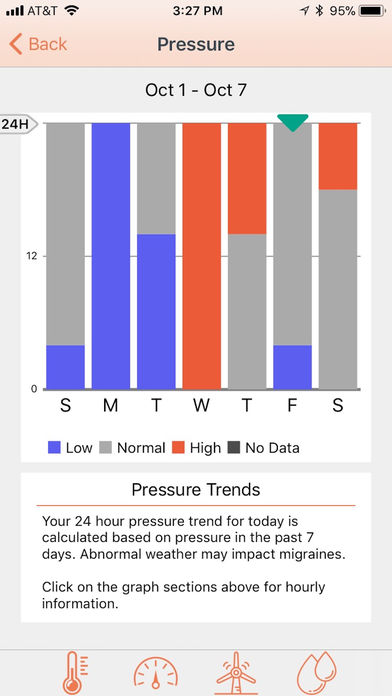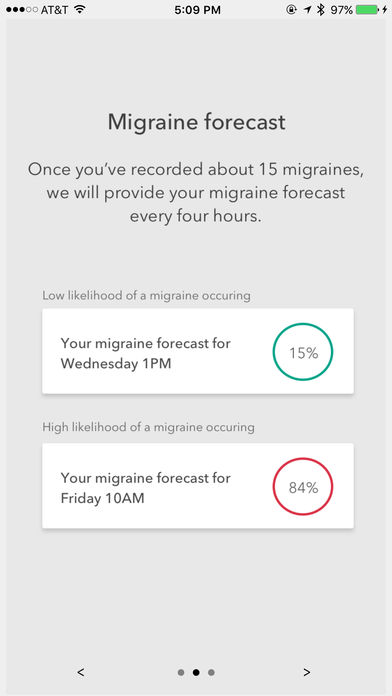 Mountain View, California-based Second Opinion Health is seeing strong feedback since recently exiting stealth mode for release of its first product Migraine Alert, an app that provides personalized predictions of migraine episodes for people with intermittent migraines. The company's app, currently being offered direct to consumers, is being studied at the Mayo Clinic in trials backed by pharmaceutical company Allergan.
Mountain View, California-based Second Opinion Health is seeing strong feedback since recently exiting stealth mode for release of its first product Migraine Alert, an app that provides personalized predictions of migraine episodes for people with intermittent migraines. The company's app, currently being offered direct to consumers, is being studied at the Mayo Clinic in trials backed by pharmaceutical company Allergan.
While the company has plans to further flesh out the service and pursue pharmaceutical partnerships in this area, CEO Simon Bloch said that he has been happy with the performance of his company’s technology thus far and is looking toward tackling other chronic diseases moving forward.
“Most of AI is addressing things with big data, like imaging and language processing,” Bloch told MobiHealthNews. “But diseases are a very, very unique AI problem for three reasons: there is no uniform ground truth, it’s an involuntary response of the human body, and it’s a small dataset. That creates the challenge, but if you solve it, [you enable] tremendously revolutionary outcomes.”
Migraine Alert is the product of two year’s efforts into machine learning, Bloch explained. Through a smartphone -- and, in upcoming versions, a fitness wearable -- the app collects various correlative triggers including weather, activity, sleep, and stress as to build its personal predictive model. After logging fifteen episodes, Bloch said that the system is capable of predicting episodes for intermittent migraine patients (defined as those who have four to 14 episodes monthly) with higher accuracy than was previously possible.
“Fifteen [samples] is a unique characteristic of our algorithm, it’s considered extremely fast,” he said. “The usual research is like three times more episodes needed in order to predict with reasonable accuracy. Our accuracy right now is at 85 percent, which is extremely good accuracy."
After receiving positive feedback from participants of a study conducted by the Mayo Clinic, Second Opinion Health released the first commercial iteration of its platform to users in early August, which so far only utilizes the smartphone and weather data to make its predictions. Although Bloch said that he is happy with this this initial release, which has been featured by Apple as one of the top paid medical apps, he is looking forward to the release of an updated version that will also implement the activity, sleep, and stress metrics collected by a wearable (currently limited to a Fitbit device, although Bloch said that the company isn’t ruling out other wearables). This version is what continues to be explored in clinical trials being conducted at the Mayo Clinic and the University of Southern California, which are being funded by global pharmaceutical company Allergan.
 Migraine treatments have been of particular interest to Allergan and other major pharmaceutical companies who are moving forward with novel calcitonin gene-related peptide (CGRP)-therapies, Bloch noted. With these being the first treatments developed for migraine treatment from the ground up in roughly two decades, he said his company is looking to insert their machine learning platform into the pharmaceuticals’ medication plans.
Migraine treatments have been of particular interest to Allergan and other major pharmaceutical companies who are moving forward with novel calcitonin gene-related peptide (CGRP)-therapies, Bloch noted. With these being the first treatments developed for migraine treatment from the ground up in roughly two decades, he said his company is looking to insert their machine learning platform into the pharmaceuticals’ medication plans.
“This is a very exciting time right now, where there is about four or five pharmaceutical companies that are in very late stages of development and FDA application of new CGRP drugs,” Bloch said. “What I’ve learned is that most of these companies want to have a mobile technology that can be a companion to their drugs that they are going to be releasing next year. [That’s] one of the targets for us — we’re looking into possibly licensing our technology for pharmaceutical technologies so they can supplement their molecules, their drugs, with a companion app that would make drug efficacy even better.”
Second Opinion Health is self-funded, and only just came out of stealth mode with the August release of Migraine Alert. Both Bloch and Chief Technology Officer Jitendra Kulkarni are veterans of Samsung Electronics and have a history within the entrepreneurial space. The company is staffed by a collection of headache specialists from the Mayo Clinic and the University of Southern California, although Bloch said he was unable to disclose their names as of yet. Although Second Opinion Health is giving migraine prediction the lion's share of its focus, Bloch made it clear that other chronic conditions will be certainly on the company’s radar over the next few years.
“We want to teach computers to detect critical incidence in chronic diseases using individual data that is collected in the background,” he said. “The first deployment of this is migraines, but our technology is then applicable to other chronic and/or neurological diseases because of the technological solution that we have, and we do believe in these enablers of revolutionary outcomes that support personalized care, actionable self-care, availability anytime, anywhere, and treatments and prevention.”

















